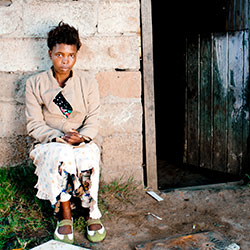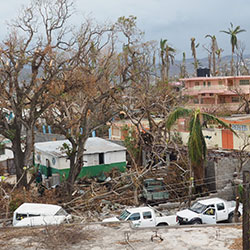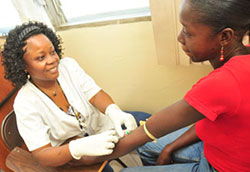January 9, 2019
Happy New Year!
In 2018 we at Fogarty's
Center for Global Health Studies continued our work catalyzing research to address global health challenges through multidisciplinary and multi-sector dialogue, collaboration and training. Here are some highlights.



Photos by subman/iStock/Thinkstock;
Coralie Giese, CDC, CC BY 2.0;
Hugue-Robert Marsan for Fogarty/NIH
In January 2018, we held a meeting of the
Adolescent HIV Prevention and Treatment Implementation Science Alliance, which addresses implementation challenges related to prevention, screening and treatment of HIV among adolescents in sub-Saharan Africa. We're excited to have received additional funding from the NIH Office of AIDS Research to extend the Alliance for three additional years, and to expand our membership to include 11 new teams of NIH-funded implementation scientists and their in-country partners. The Alliance will meet in Kampala, Uganda, in February.
We launched a project on
Health Research in Humanitarian Crises in April 2018, beginning with a workshop that included key research and humanitarian stakeholders from diverse disciplines and geographic regions. The project aims to catalyze timely, high-quality, ethical and actionable research in humanitarian crises, and encourage the uptake of evidence into the policy and practice of organizations that respond to these crises. In 2019 we will focus on community engagement, noncommunicable diseases (NCDs) and case study development, including an active invitation to
submit proposals to develop case examples by January 21.
In July 2018, a special issue of the journal
AIDS was launched to a standing room-only audience at the International AIDS Conference in Amsterdam. The journal supplement, a result of our multi-year project on
enhancing HIV research and care platforms to address NCDs in HIV-infected populations, includes a comprehensive research agenda, and features articles related to disease burden, models of integrated care, cost and cost-effectiveness, health workforce needs and health promotion strategies. This year, we expect to work on more publications related to the development and use of models to estimate disease burden and the potential impacted of integrated care.
Last year we also conducted an internal review of our activities since the start of the Center in 2012 that is helping us better understand our unique niche, project outcomes, and areas of strength and future growth. Look for the results in the coming months.
In 2019, we anticipate launching new journal supplements on the science of stigma reduction and emergency care research. In the fall we will convene a meeting for U.S. and Latin American scientists studying prevention of childhood obesity to share lessons learned, and together develop new research priorities and collaborations.
We continue to be extremely appreciative of our Fogarty leadership and colleagues, the CGHS subcommittee of the Fogarty Advisory Board, and our NIH partners, who continually enrich and enable our work.
Wishing you all the best in 2019,
Nalini Anand, J.D., M.P.H.
Director, Center for Global Health Studies